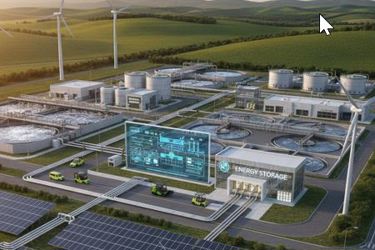Water Treatment Plant Microgrid Market To Hit $5.4B By 2033

According to latest research by Research Intelo, the global water treatment plant microgrid market size was valued at $1.8B in 2024 and is projected to reach $5.4B by 2033, expanding at a CAGR of 12.7% during 2024–2033. The primary driver behind this robust growth is the increasing need for energy resilience and sustainability in water treatment operations, especially in the wake of climate change, grid instability, and the global push toward decarbonization.
The global water treatment plant microgrid market is witnessing rapid growth, driven by the increasing need for reliable and sustainable energy solutions in water infrastructure. As water treatment facilities become more critical for urban infrastructure, the adoption of microgrids—integrating renewable energy sources, storage, and advanced control systems—offers a compelling solution for uninterrupted and cost-effective operations.
Key Drivers
One of the primary drivers of market growth is the rising adoption of renewable energy sources, such as solar and wind, integrated with microgrids. Water treatment plants require consistent electricity to operate pumps, filtration units, and chemical dosing systems. Microgrids enable these facilities to remain operational during power outages, which is critical for urban water supply systems.
Additionally, growing concerns over climate change and environmental regulations are encouraging municipalities and private operators to adopt energy-efficient solutions. Microgrids not only provide backup power but also optimize energy consumption by leveraging smart grid technologies, leading to significant cost savings.
Technological Advancements
Technological innovation plays a pivotal role in market expansion. Modern microgrids incorporate advanced energy storage systems, predictive maintenance, and real-time monitoring tools. Energy management software allows operators to balance load demand, integrate renewable resources, and minimize downtime. Moreover, the convergence of IoT and AI with microgrid systems is enhancing predictive analytics, fault detection, and automated energy distribution.
Market Challenges
Despite the promising outlook, several challenges could hinder growth. High initial investment costs, complex integration with existing infrastructure, and lack of skilled personnel for system management are key concerns. However, government incentives and funding for green energy projects are gradually mitigating these barriers.
Technological Advancements
The water treatment plant microgrid market is witnessing significant technological advancements that enhance efficiency and reliability. Modern microgrids integrate advanced energy storage systems, smart sensors, and real-time monitoring tools to optimize energy usage. The adoption of IoT and AI-driven solutions enables predictive maintenance, fault detection, and automated energy distribution, while hybrid systems combining solar, wind, and conventional power sources ensure uninterrupted operation and reduced carbon footprint.
Competitive Landscape
- Siemens AG
- Schneider Electric SE
- General Electric Company
- ABB Ltd.
- Eaton Corporation plc
- Honeywell International Inc.
- SUEZ Water Technologies & Solutions
- Veolia Environnement S.A.
- Xylem Inc.
- Emerson Electric Co.
- Mitsubishi Electric Corporation
Future Outlook
The future of the water treatment plant microgrid market looks promising, with increasing focus on sustainability and energy resilience. As municipalities and industries prioritize reliable, low-carbon solutions, microgrid adoption is expected to accelerate globally. Emerging trends such as hybrid microgrid systems and AI-driven energy optimization will further propel market growth, ensuring efficient and resilient water treatment operations.
Report: https://researchintelo.com/report/water-treatment-plant-microgrid-market
Source: Research Intelo
